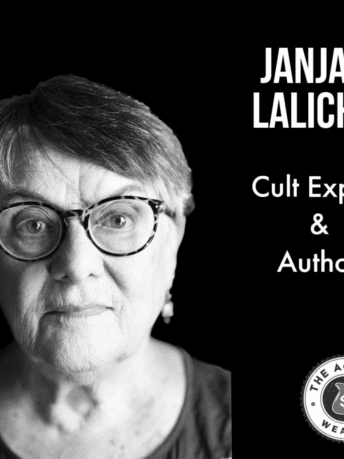This article originally appeared on vice.com
Meet Teal Swan, a YouTuber who proves selling salvation to desperate people is an equal opportunity racket.
“It’s always a gross dude.”
As someone who has spent too much time writing about cults (sorry everyone!) this is a sentiment I’ve heard a lot lately. Almost nobody can think of a woman-led cult off the top of their head (Ma Anand Sheela doesn’t count), but most could easily list off a bunch of narcissistic men who amassed notorious cult followings. One wonders if it requires an especially malignant strain of toxic masculinity for someone to declare themselves a prophet/guru/healer and exploit vulnerable followers for whatever strange purpose.
Turns out it’s not exclusively dudes who do this. Cult researcher and California State University prof Janja Lalich assures me there are many women cult leaders, and destructive ones too. A New Age spiritual guru named Teal Swan has sparked a particularly heated debate after at least one former student died by suicide. Teal claims to have super-sensory powers, to be able to see what’s happening inside people’s bodies, and to help people recover repressed memories of childhood trauma. She was recently the subject of a six-part Gizmodo podcast called The Gateway.
Though Teal has denied cult allegations, her massive social media influence and controversial practices around depression and suicide—sometimes encouraging students to imagine their own deaths in detail—have placed her on the dangerous side of Lalich’s cult radar. And with nearly a half million YouTube subscribers and hundreds of videos on everything from skincare to relationships to cryptocurrency, Teal doesn’t immediately fit the (gross, dated) profile of a cult leader. In the past, female gurus like Elizabeth Clare Prophet and Judy Zebra Knight made headlines building doomsday shelters and claiming to channel ancient spirits, but Teal Swan brings in a new level of 21st century internet literacy as she uses YouTube and SEO to find desperate people.
To better understand what a present-day woman-led cult looks like, I called up Gizmodo reporter Jennings Brown, who visited Teal Swan’s retreat centre in Costa Rica. Brown mostly avoids the cult label in his reporting, and acknowledges that Teal is serving a need for shame-free conversation about taboo subjects like child sexual abuse and suicidal ideation. But he also shares concern for the people who devote their lives to her “dark brand of spirituality” without professional oversight or accountability.
“When she finally arrives, it’s very theatrical,” Brown recalled of their first in-person meeting in Costa Rica, where students had paid upwards of $2,000 to work with Teal. “She descends this stone staircase, and she has two close followers on either side, and she’s perched higher than everyone else. And one of the first things they do is a death meditation, where she said ‘we’re all going to get suicidal for a moment.’”
Brown told VICE he was caught off guard when Teal instructed people to envision exactly how they would end their own life. But the participants seemed unfazed by the exercise, already familiar with Teal’s intense video style. In clips still available on YouTube she has suggested suicide is a reset button, feels like a relief, and that suicidal thoughts are a valid reaction to bad situations. In comments below viewers express their fear and shame about wanting to go through with it.
Brown found Teal’s unconventional approach doesn’t line up with suicide research. A new study on suicide contagion released this week found mention of suicide methods in media increased the chances of subsequent suicides. “That’s one big thing with Teal, she tells people they have to decide whether they’re going to commit to life or not,” he told VICE. “That doesn’t match with how humans behave… The data says nobody is 100 percent committed to living or death—even in the middle of a suicide attempt, there’s still part of you that wants to live.”
Lalich sees this kind of dramatic therapy as a way to manipulate vulnerable people. “They can get very unstable, and that’s what she’s counting on,” she said. “Cult leaders will always get their people to what I call ‘reframe their lives.’ They reinterpret their lives so they see everything from before the cult as messed up, and only by staying with the cult leader will they get straightened out.” (To this day, many members of the “Teal Tribe” say they are only alive today because of her teachings.)
Brown was curious about how these followers found Teal, and many of them described “some sort of cosmic delivery.” ”They were putting this intention out to the universe, and Teal’s videos were sort of coming to them,” said Brown. But Teal had a more straightforward answer to this question. “She said she basically targets them, using basic SEO, and basic Google tags, so when people are searching things like ‘I want to kill myself,’ they find her videos.”
Teal Swan didn’t respond to VICE’s requests for comment, but I was able to get some answers from a Google representative on how they deal with suicide-related searches. The tech giant doesn’t allow autocomplete on searches that indicate self-harm, and serves a “results box” at the top with the phone numbers of trusted country-specific organizations. But with straight-up titles like “I Want to Kill Myself (What to Do If You’re Suicidal)” and “What to Do If You Feel Hopeless,” Teal’s videos aren’t hard to stumble across on YouTube’s search platform.
Lalich says she’s been hearing complaints about Teal for quite some time. “Mostly they’re from people who feel they’ve been exploited,” she said. “They want some kind of validation that they were right in feeling that way about their experiences.”
But for everyone who felt exploited, there are many more who stand by their guru. Like other personalities operating in the New Age self-help space, Teal has a wealth of benign-seeming content about setting goals, finding joy, and breaking out of destructive patterns. Videos on “how to see auras,” “how to activate and open your third eye,” or “how to use your intuition” and others have amassed tens of millions of views combined.
Whether or not her followers accept the cult label, Lalich says there’s more work to be done to expose exploitive gurus and fight cult stigma. “You certainly don’t want to run up to someone and say ‘hey, you’re in a cult.’ You have to talk to them tactfully about it,” Lalich said. “I think if we can get more information out there about what cults really are, how they deceive and take advantage, it may stop people from having such a negative reaction to the word. Because it’s useful for identifying what’s wrong with that group.”
Brown said Teal’s online community is as active as ever—still growing at about the same rate. He says his biggest takeaway was that young, controversial figures who make big promises like Teal will continue to find an audience as long as there are gaps in mental health resources. “If you google something about suicide, you’re probably going to find that suicide lifeline up top, but it’s not very human. It’s just a number,” he said. “My takeaway is we need more options for people who are struggling, from other sources that are being held more accountable.”
If you are struggling with depression or suicide, call the National Suicide Prevention Lifeline (US) at 1-800-273-8255 or the Canada Suicide Prevention Service at 1-833-456-4566.
July 26, 2024






